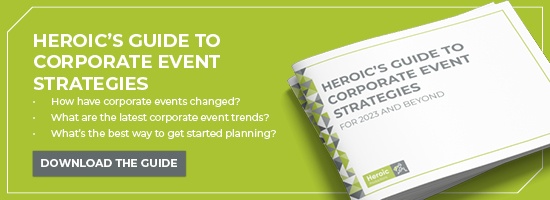February 17, 2023
How to Choose Your Next Event: Savvy Corporate Event Managers Share 5 Secrets for Success
As corporate event managers, we know how important corporate events are for developing meaningful employee and customer relationships. Choosing the perfect event can be challenging. Whether planning a conference, trade show, product launch, or team-building event, you want to ensure the experience is memorable and effective for all. When you take a moment to consider all aspects—your audience, goals, and resources—you can create the perfect event.
Experienced, savvy event planners share five tips for planning an unforgettable event for any budget.
- Pro tip: your event strategy always comes before you source a venue or start any planning.
5 secrets from corporate event managers
1. Know your audience.
When deciding what your new event will be, corporate event managers first assess who the attendees are — especially if it’s an external event. When you know your target audience, it’s much easier to imagine an event idea that will resonate and create a lasting impression.
Demographics, such as the average age and occupation of your attendees, are essential but also consider your audience’s feelings. You must meet attendees where they are emotionally on the day of your event. Consider how they will feel when they arrive after a long flight. Think about how you want them to feel once the event is over.
Once you understand your audience, you can develop an event strategy around the audience’s needs. If you don’t know your audience, consider creating a pre-event survey to get to know them better. You can ask prospective attendees what they’re looking for in an event, but you can also ask them broader questions to get a sense of how they feel about your brand, career, and relationship with your company. Find out their frame of mind and what they need to get out of this experience. One way to do this effectively is by sending a pre-event survey.
2. Strategize event themes.
Once you understand your target audience, you can consider event themes like venue, location, activities, and entertainment.
For example, with a strategy in hand, the objectives for your event will determine whether an audience may benefit more from a relaxed, networking-style event or a high-energy, team-building activity. Does a team-building theme need an open bar or a group training session? It may be both, but not in that order. The theme helps to inform a more cohesive and memorable event. Consider the activities you might want to include in your next event, and develop those activities around your event’s theme.
Recommended Reading: Corporate Event Strategy: The Secret Behind A Successful Corporate Event—and How to Get It Right, Every Time
3. Timing is everything.
The timing of an event will affect the overall flow, and choosing the timing for your event is an excellent opportunity to get creative with strategy. Should a sales event be during a busy time of year, such as the holidays? Or would sales representatives benefit from hosting an event ahead of the holidays? Advanced planning gives you more venue options and potential early-bird booking discounts.
Timing also allows you to plan around conflicts with other events, industry conferences, and weather. The impact on your attendees’ experience depends on timing, especially when the climate is a factor for the venue’s location. If you want your attendees to accept awards in a garden, you’ll need to plan far ahead for a sunny season—or be prepared to buy plane tickets somewhere warm.
4. Resources guide logistics.
Knowledgeable corporate event managers understand their resources, especially when it comes to the budget. Your event strategy and budget will help you choose an event that fits your financial parameters while providing a memorable experience.
With a budget in mind, you can select locations based on the climate, time of year, and audience needs. You can also begin hiring vendors and assess entertainment options to meet your attendees’ expectations.
Corporate event managers looking to make more of a budget prioritize essentials and, above all–plan ahead. For our budget tips, check out our post 5 Tips to Make the Most of Your Corporate Event Budget.
5. Prioritize high-value partnerships.
Event partners reflect a company’s capabilities, so you’ll want to research and select vendors who align with your values and experience. These partnerships will guide your choices for your event. That’s why we always recommend reading reviews and requesting customer testimonials before booking a vendor. Look for knowledgeable vendors who can provide the services you need. Trusted partners who come highly recommended can offer creative solutions that will leave your attendees in awe. Events are most successful when you choose team members, especially corporate event managers, who can collaborate and strategize an event’s production from start to finish.
Heroic’s corporate event managers can help
The strategic collaboration is where Heroic comes in. We’ve been in the business for a long time and know how to adapt to changes. We’re a one-stop shop for producing dynamic and effective events. We leverage years of event management experience to produce experiences that engage your audiences and create measurable impact. Please reach out to connect with our corporate event managers.





